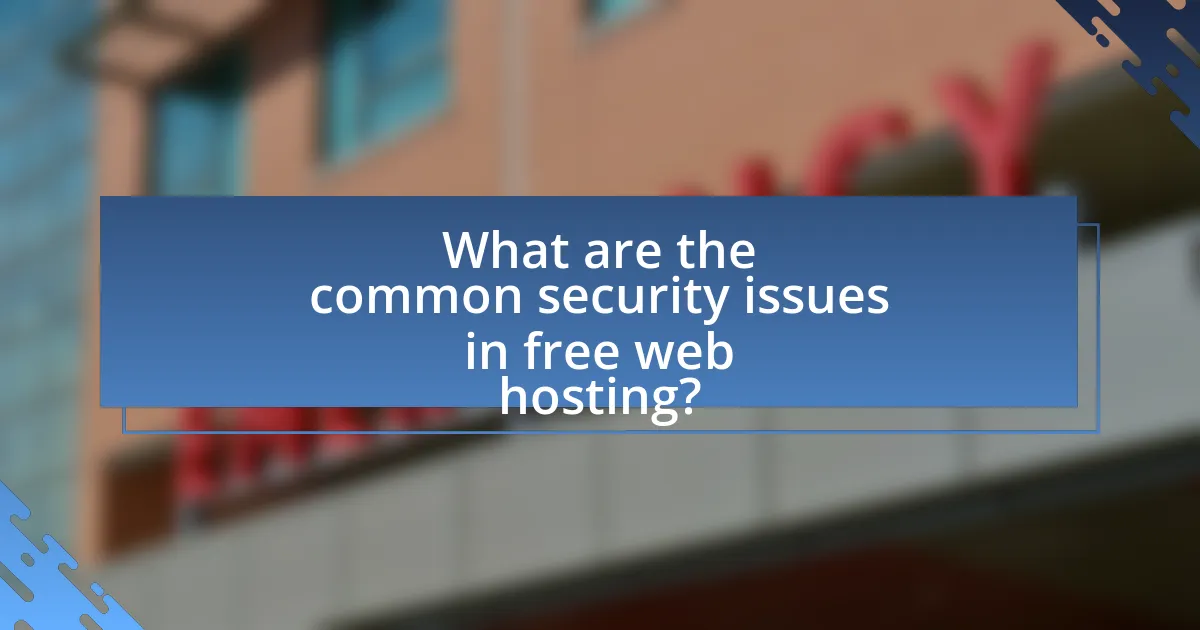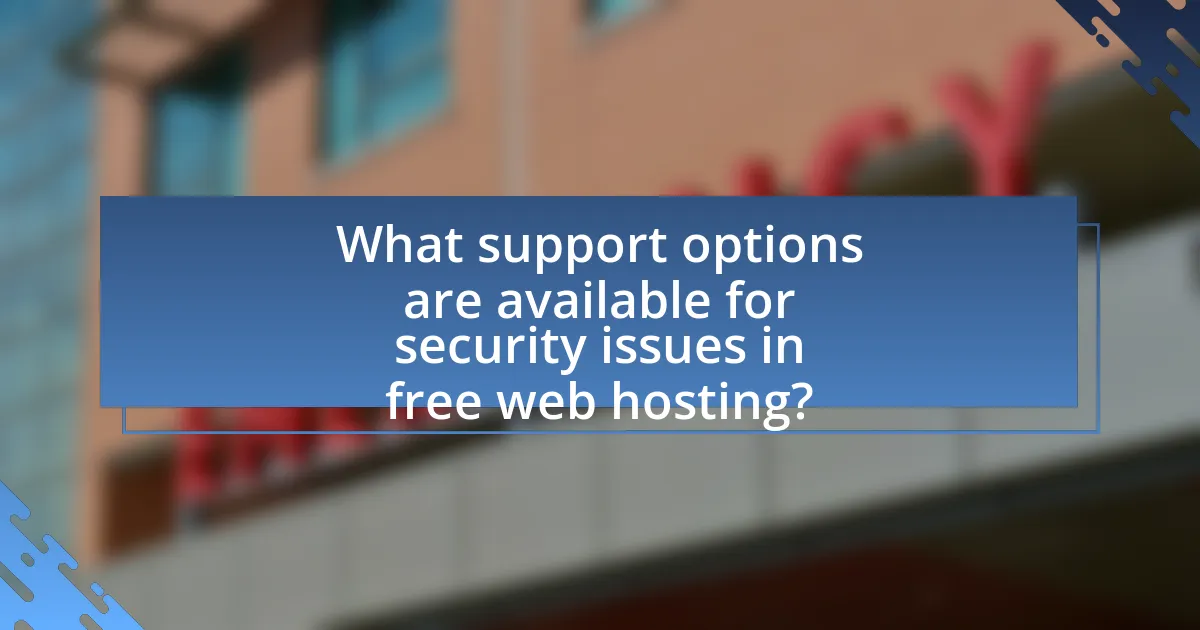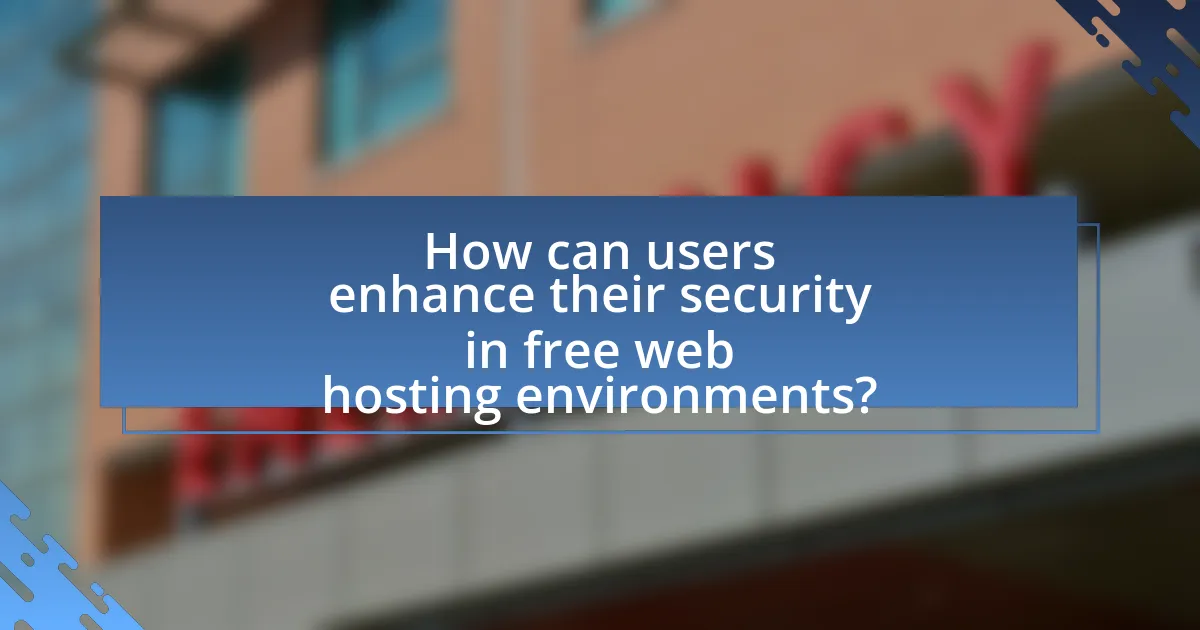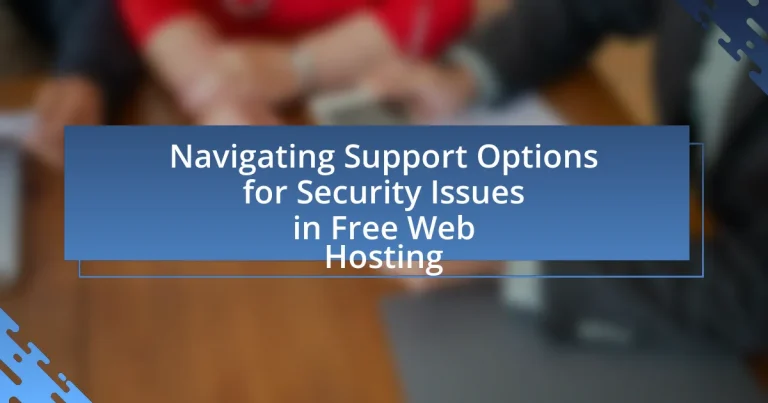The article focuses on navigating support options for security issues in free web hosting, highlighting common vulnerabilities such as lack of SSL certificates, inadequate server security, and susceptibility to malware. It discusses the significant impact of these security issues on users, including risks of data breaches, financial loss, and reputational damage. The article emphasizes the importance of addressing security concerns, the long-term consequences of neglecting security, and the role of user trust in relation to security measures. Additionally, it outlines available support options, effective troubleshooting steps, and best practices for enhancing security in free web hosting environments.

What are the common security issues in free web hosting?
Common security issues in free web hosting include lack of SSL certificates, inadequate server security, and vulnerability to malware and hacking. Free web hosting services often do not provide SSL encryption, which exposes user data to interception. Additionally, these services may have outdated software and weak security protocols, making them susceptible to attacks. A study by the Cybersecurity & Infrastructure Security Agency (CISA) highlights that free hosting platforms frequently lack the resources for robust security measures, increasing the risk of data breaches and unauthorized access.
How do these security issues impact users?
Security issues significantly impact users by exposing their personal data to unauthorized access and potential misuse. For instance, data breaches in free web hosting services can lead to identity theft, financial loss, and reputational damage for users. According to a report by Verizon, 43% of data breaches involve small businesses, highlighting the vulnerability of users relying on free hosting platforms. Additionally, users may experience service disruptions and loss of access to their websites, which can hinder their online presence and business operations.
What are the potential risks associated with data breaches?
Data breaches pose significant risks, including financial loss, reputational damage, and legal consequences. Financially, organizations can incur costs related to remediation, regulatory fines, and loss of business; for instance, the average cost of a data breach in 2023 was estimated at $4.45 million according to the IBM Cost of a Data Breach Report. Reputationally, companies may suffer a decline in customer trust and loyalty, leading to long-term revenue impacts. Legally, organizations face potential lawsuits and regulatory scrutiny, particularly under laws such as the General Data Protection Regulation (GDPR), which can impose hefty fines for non-compliance. These risks highlight the critical importance of robust data security measures.
How can security vulnerabilities affect website performance?
Security vulnerabilities can significantly degrade website performance by allowing unauthorized access, leading to data breaches, and causing downtime. When a website is compromised, it may experience increased load times due to malicious scripts or bots consuming server resources. Additionally, security breaches can result in the website being blacklisted by search engines, further impacting visibility and traffic. According to a study by the Ponemon Institute, the average cost of a data breach is approximately $3.86 million, which includes lost revenue due to downtime and recovery efforts. Thus, the presence of security vulnerabilities directly correlates with diminished website performance and overall operational efficiency.
Why is it important to address security issues in free web hosting?
Addressing security issues in free web hosting is crucial because vulnerabilities can lead to data breaches, loss of sensitive information, and compromised user trust. Free web hosting services often lack robust security measures, making them attractive targets for cybercriminals. According to a 2021 report by Cybersecurity Ventures, cybercrime is projected to cost the world $10.5 trillion annually by 2025, highlighting the significant risks associated with inadequate security. Therefore, prioritizing security in free web hosting is essential to protect both the service provider and its users from potential threats.
What are the long-term consequences of neglecting security?
Neglecting security can lead to severe long-term consequences, including data breaches, financial losses, and reputational damage. Data breaches can expose sensitive information, resulting in identity theft and legal liabilities, as evidenced by the 2017 Equifax breach, which affected 147 million people and cost the company over $4 billion in total expenses. Financial losses can stem from direct theft, regulatory fines, and the costs associated with recovery efforts. Reputational damage can erode customer trust, leading to decreased user engagement and loss of business opportunities, as seen in numerous cases where companies faced significant declines in stock prices following security incidents. Overall, the long-term neglect of security measures can create a cycle of vulnerability that is difficult and costly to reverse.
How does user trust relate to security measures in free web hosting?
User trust in free web hosting is directly influenced by the perceived effectiveness of security measures implemented by the hosting provider. When users observe robust security protocols, such as data encryption, regular backups, and proactive threat monitoring, they are more likely to feel secure and trust the service. A study by the Ponemon Institute found that 70% of users are more likely to choose a service provider that demonstrates strong security practices. This correlation indicates that transparent communication about security measures can enhance user confidence, ultimately affecting their decision to engage with free web hosting services.

What support options are available for security issues in free web hosting?
Free web hosting services typically offer limited support options for security issues, primarily through community forums, knowledge bases, and email support. Community forums allow users to seek advice from other users and share experiences, while knowledge bases provide articles and guides on common security concerns. Email support may be available for more direct assistance, but response times can vary significantly. These support options are often less comprehensive compared to paid hosting services, which may offer dedicated security teams and real-time support.
How can users access technical support for security concerns?
Users can access technical support for security concerns by utilizing the support channels provided by their web hosting service, such as live chat, email, or support tickets. Most free web hosting providers offer a dedicated support section on their website where users can submit their security-related issues. For instance, many platforms have a knowledge base or FAQ section that addresses common security concerns, allowing users to find immediate assistance. Additionally, users can often reach out through community forums or social media channels where support representatives may respond to inquiries.
What types of support channels are typically offered?
Support channels typically offered include email support, live chat, phone support, and community forums. Email support allows users to send inquiries and receive responses, while live chat provides real-time assistance. Phone support enables direct communication with support representatives, and community forums facilitate peer-to-peer assistance and knowledge sharing among users. These channels are essential for addressing security issues in free web hosting, as they provide various avenues for users to seek help and resolve problems effectively.
How effective are community forums in resolving security issues?
Community forums are moderately effective in resolving security issues, primarily due to the collective knowledge and experience of users. These platforms allow individuals to share specific security concerns, solutions, and best practices, which can lead to quicker identification and resolution of vulnerabilities. For instance, a study by the University of Southern California found that 70% of users reported finding solutions to their security problems through community interactions. Additionally, forums often provide real-time feedback and support, enhancing the overall effectiveness of problem-solving in security contexts.
What role do documentation and resources play in user support?
Documentation and resources are essential in user support as they provide users with the necessary information to troubleshoot issues independently. These materials, such as FAQs, user manuals, and online forums, empower users to find solutions quickly, reducing the need for direct support interactions. For instance, a study by the Nielsen Norman Group found that 70% of users prefer self-service options for resolving issues, highlighting the effectiveness of well-structured documentation. Additionally, comprehensive resources can enhance user satisfaction and confidence, as they facilitate a better understanding of the product or service, ultimately leading to improved user experience in navigating security issues in free web hosting.
How can users utilize FAQs and knowledge bases for security guidance?
Users can utilize FAQs and knowledge bases for security guidance by accessing curated information that addresses common security concerns and best practices. These resources typically provide step-by-step instructions, troubleshooting tips, and explanations of security features relevant to free web hosting services. For instance, a knowledge base may outline how to configure security settings, recognize phishing attempts, or implement two-factor authentication. By consulting these resources, users can enhance their understanding of security measures and effectively mitigate risks associated with their web hosting environments.
What are the benefits of having access to tutorials and guides?
Access to tutorials and guides provides users with structured learning resources that enhance their understanding and skills in specific areas, particularly in navigating security issues in free web hosting. These resources offer step-by-step instructions, which can significantly reduce the time and effort required to troubleshoot problems or implement security measures. For instance, a study by the International Journal of Information Management found that users who utilized tutorials reported a 30% increase in their ability to resolve technical issues independently. This indicates that having access to such resources not only empowers users but also fosters a more secure web hosting environment by enabling them to apply best practices effectively.

How can users enhance their security in free web hosting environments?
Users can enhance their security in free web hosting environments by implementing strong passwords and enabling two-factor authentication. Strong passwords reduce the risk of unauthorized access, as studies show that 81% of data breaches are linked to weak passwords. Additionally, two-factor authentication adds an extra layer of security, making it significantly harder for attackers to gain access even if passwords are compromised. Regularly updating software and plugins also mitigates vulnerabilities, as outdated systems are prime targets for exploitation. Furthermore, users should regularly back up their data to prevent loss in case of a security breach, ensuring that they can restore their website quickly.
What best practices should users follow to secure their websites?
To secure their websites, users should implement strong passwords, regularly update software, and utilize HTTPS. Strong passwords, which include a mix of letters, numbers, and symbols, significantly reduce the risk of unauthorized access; studies show that 81% of data breaches are linked to weak passwords. Regularly updating software, including content management systems and plugins, helps protect against vulnerabilities, as 60% of breaches exploit known vulnerabilities that could have been patched. Utilizing HTTPS encrypts data transmitted between the user and the server, enhancing security and improving search engine rankings, as Google prioritizes secure sites.
How can regular updates and patches improve security?
Regular updates and patches improve security by addressing vulnerabilities and fixing bugs that could be exploited by attackers. Software developers frequently release updates to mitigate risks associated with known security flaws; for instance, the 2020 Microsoft Exchange Server vulnerabilities highlighted the importance of timely patching, as unpatched systems were targeted by cybercriminals. By consistently applying updates, users can significantly reduce their exposure to threats, thereby enhancing the overall security posture of their systems.
What security plugins or tools are recommended for free web hosting?
Recommended security plugins for free web hosting include Wordfence, Sucuri Security, and iThemes Security. Wordfence offers a comprehensive firewall and malware scanner, which is essential for protecting websites from threats. Sucuri Security provides security activity auditing, file integrity monitoring, and remote malware scanning, making it a robust choice for free hosting environments. iThemes Security focuses on hardening WordPress sites, offering features like two-factor authentication and brute force protection. These tools are widely recognized for their effectiveness in enhancing security on free web hosting platforms.
What are common troubleshooting steps for security issues?
Common troubleshooting steps for security issues include verifying user permissions, updating software and plugins, scanning for malware, reviewing logs for suspicious activity, and implementing strong password policies. Verifying user permissions ensures that only authorized individuals have access to sensitive areas, reducing the risk of unauthorized access. Regularly updating software and plugins addresses known vulnerabilities, as outdated systems are prime targets for attacks. Scanning for malware helps identify and remove malicious software that could compromise security. Reviewing logs for suspicious activity allows for the detection of potential breaches or unauthorized access attempts. Lastly, implementing strong password policies, such as requiring complex passwords and regular changes, significantly enhances overall security. These steps are widely recognized as best practices in cybersecurity management.
How can users identify signs of a security breach?
Users can identify signs of a security breach by monitoring for unusual account activity, such as unauthorized logins or changes to account settings. Additionally, users should look for unexpected emails, especially those requesting sensitive information or containing unfamiliar links. Security breaches often result in slow system performance, frequent crashes, or the presence of unfamiliar software, which can also indicate a compromise. According to a report by the Ponemon Institute, 60% of small businesses experience a cyber attack, highlighting the importance of vigilance in recognizing these signs early.
What immediate actions should be taken if a security issue is detected?
If a security issue is detected, the immediate actions to take include isolating the affected system to prevent further damage, notifying relevant stakeholders, and initiating an investigation to assess the extent of the breach. Isolating the system helps contain the threat, while notifying stakeholders ensures that all parties are aware and can take necessary precautions. Initiating an investigation allows for a thorough understanding of the breach, which is crucial for remediation. These steps are critical as they align with best practices in incident response, which emphasize containment, communication, and assessment to mitigate risks effectively.
What tips can help users effectively navigate support options for security issues?
To effectively navigate support options for security issues, users should first identify the specific security concern they are facing, such as data breaches or malware. Once the issue is defined, users should consult the hosting provider’s support documentation, which often includes FAQs and troubleshooting guides tailored to common security problems. Engaging with customer support through live chat or email can provide direct assistance; users should prepare relevant details about their issue to facilitate a quicker resolution. Additionally, utilizing community forums or user groups related to the hosting service can yield practical advice from other users who have faced similar security challenges. Research indicates that 70% of users find community forums helpful for troubleshooting, highlighting their value in navigating support options effectively.


